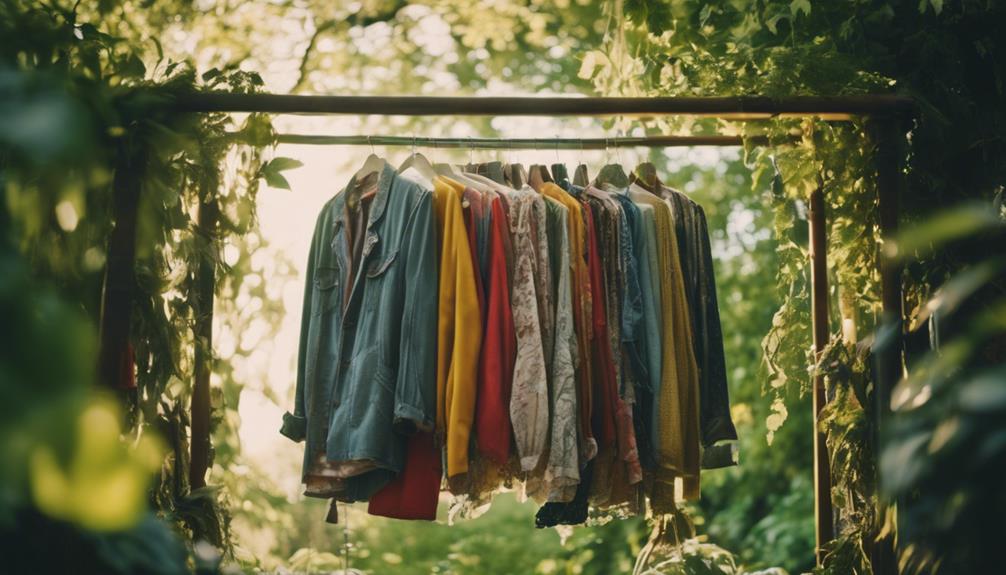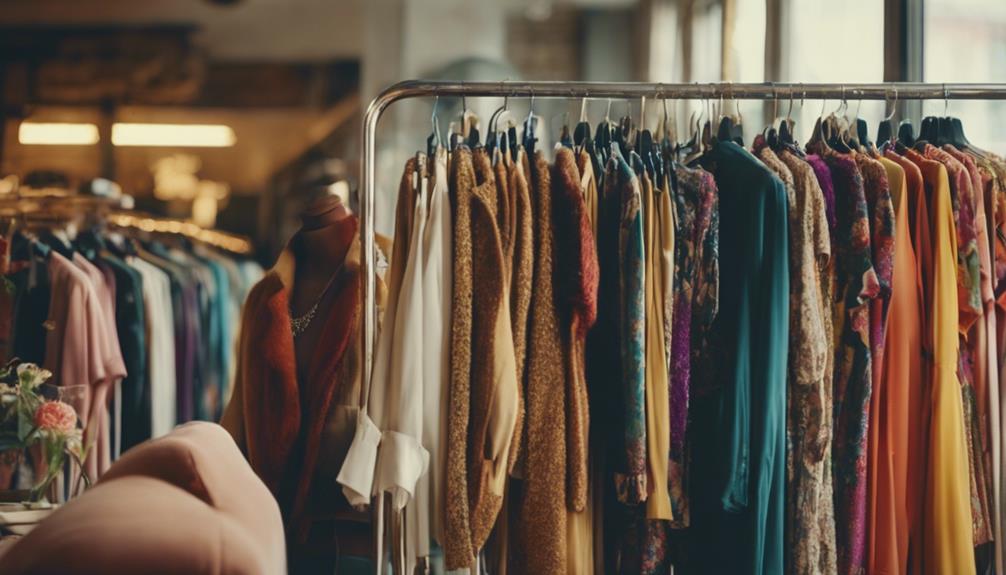You can change your fashion approach by incorporating sustainable practices that are both innovative and impactful. Begin by repurposing old clothes into one-of-a-kind pieces, or participate in community clothing swaps to update your wardrobe while connecting with like-minded individuals. Explore thrift shopping for classic finds and to reduce textile waste. Opt for renting outfits for events to enjoy variety without the long-term commitment. Ensure your clothing lasts by taking care of them mindfully and getting them repaired when necessary. By supporting ethical fashion brands, you align your style with your values. The positive impact of sustainable choices on both you and the planet is remarkable, and there is so much more to explore!
Key Takeaways
- Transform Old Clothes: Upcycle your old garments into unique pieces, drastically reducing textile waste and showcasing your creativity.
- Join Clothing Swaps: Participate in community clothing swaps to exchange items, meet eco-conscious individuals, and extend the life of garments.
- Explore Thrift Shopping: Discover hidden gems in thrift stores, promoting reuse and significantly cutting down on landfill waste.
- Rent Fashion: Opt for clothing rentals for special occasions, providing variety and versatility while supporting sustainable fashion practices.
Embrace Sustainable Fashion DIYs
Embracing sustainable fashion DIYs not only lets you personalize your wardrobe but also helps reduce your impact on the environment. By engaging in upcycling, you can transform old clothing into unique pieces, greatly minimizing textile waste. Did you know that the average consumer now discards about 60% more clothing than in 2000? Each time you repurpose an item, you're contributing to a solution.
Consider starting with simple DIY projects, like creating a slip dress from an old shirt or turning jeans into a stylish bag. These hands-on activities not only enhance your creativity but also promote a sustainable lifestyle. Learning basic sewing skills through modern mending techniques can extend the life of your garments, reducing environmental impact by up to 30% when you keep clothing for just nine more months.
Moreover, as you engage in sustainable fashion, think about making beeswax wraps for food storage. This simple switch helps cut down plastic waste! By participating in workshops focused on sustainable practices, you'll gain valuable skills while building a community centered around eco-friendly fashion.
Explore Community Clothing Swaps
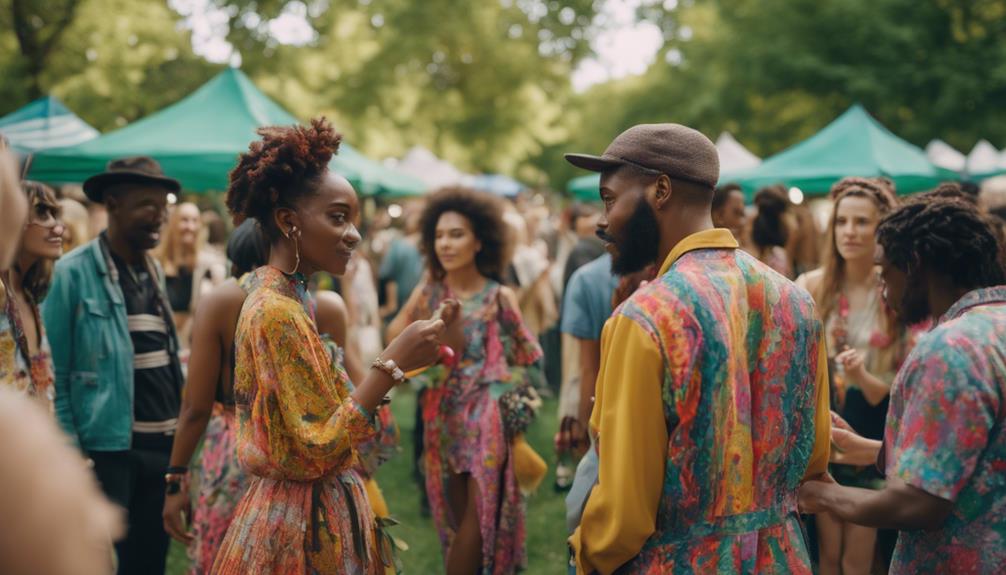
You can make a real impact on sustainability by participating in community clothing swaps. Not only do these events help reduce textile waste, but they also create opportunities to meet like-minded individuals and discover unique fashion pieces.
Organizing a local swap can be a fun way to engage your community while promoting eco-friendly practices.
Benefits of Clothing Swaps
Clothing swaps offer a fun way to refresh your wardrobe while promoting sustainability and building community connections. By participating in a clothing swap, you not only reduce fashion waste but also engage with like-minded individuals who share your values. Here are some key benefits of joining a clothing swap:
| Benefit | Description |
|---|---|
| Sustainable Practice | Reduces textile waste by extending garment life. |
| Cost-Effective | Access to new clothing without spending money. |
| Community Engagement | Strengthens social bonds and fosters a sense of belonging. |
| Awareness Raising | Educates participants on the impacts of fast fashion. |
| Circular Economy | Encourages recycling and mindful consumption habits. |
When you exchange items you no longer wear, you actively contribute to a more sustainable fashion ecosystem. Plus, hosting a clothing swap can spark discussions about eco-conscious choices, helping the community understand the importance of reducing fashion waste. So, gather your friends, create a vibrant swap environment, and embrace the joys of sustainable fashion together!
Organizing Local Events
Organizing community clothing swaps can bring people together while tackling the pressing issue of textile waste. By hosting these events, you're promoting sustainable fashion and ethical practices while creating a space for community engagement.
Here are four ways clothing swaps can make a difference:
- Reduce Waste: With 60% of clothing ending up in landfills, swapping helps extend the lifecycle of garments, minimizing environmental impact.
- Foster Connection: These events create a social atmosphere, encouraging fun interactions and helping participants feel more connected to their community.
- Raise Awareness: As you exchange garments, you'll learn about the negative effects of fast fashion, spreading awareness about sustainable practices.
- Attract Like-Minded Individuals: Research shows 71% of millennials prioritize sustainability, making clothing swaps an appealing way to engage with environmentally-conscious folks.
Discover Smart Shopping Practices
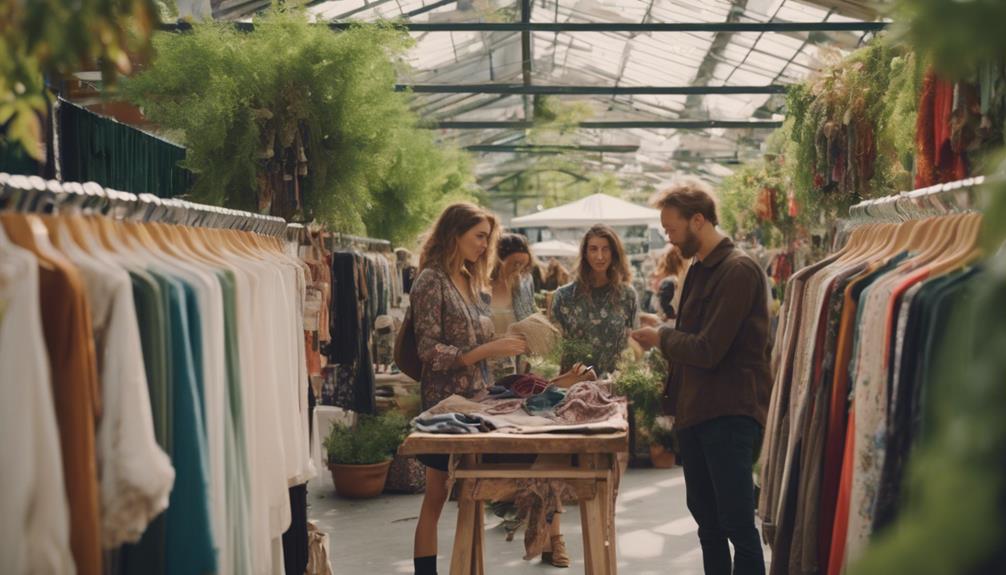
Explore smart shopping practices that prioritize sustainability and make a positive impact on the environment.
One effective way to shop sustainably is to prioritize thrift and consignment stores. These places help extend the lifecycle of garments, promoting the reuse of clothing and greatly reducing landfill waste.
Before making a purchase, research ethical brands that align with your values. Did you know that 60% of American shoppers now consider sustainability in their apparel choices? By opting for sustainable brands, you encourage responsible production practices.
Another important step is to avoid fast fashion retailers. This industry contributes to over 92 million tons of textile waste annually, which exacerbates environmental issues. Instead, invest in timeless pieces that you'll wear for years.
Extending the use of clothing by just nine months can reduce its environmental impact by 30%.
Rent and Recycle Your Wardrobe
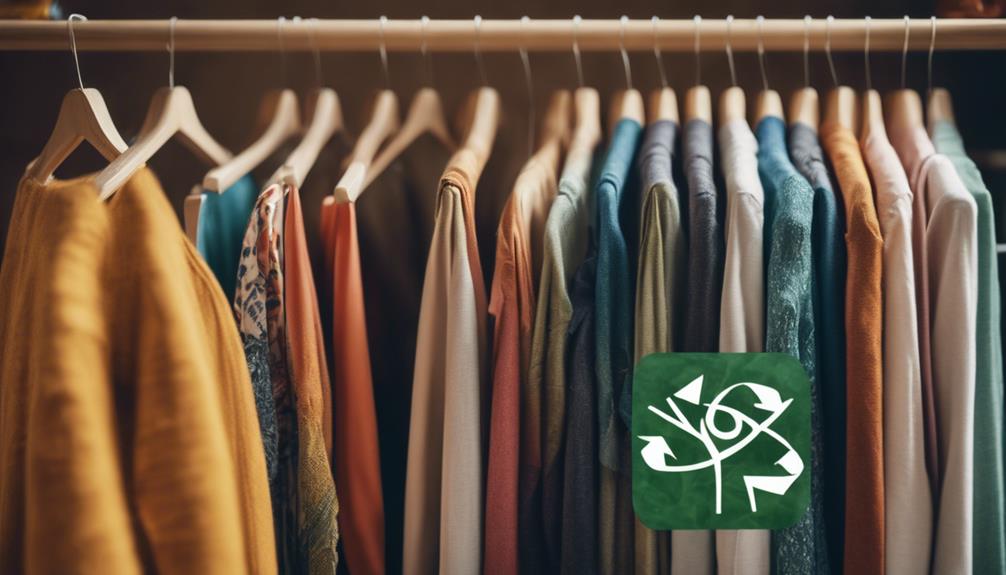
When you rent clothing, you get to explore different styles without adding to the environmental burden of new production.
Plus, recycling your old garments can help reduce waste and make a real difference in the fashion industry's impact on the planet.
Benefits of Clothing Rentals
Clothing rentals offer a sustainable way to refresh your wardrobe while markedly reducing textile waste. By renting clothes, you not only elevate your style but also contribute to a healthier planet. Here are some key benefits you'll experience:
- Reduced Waste: Renting helps curb the staggering 92 million tons of textile waste generated annually.
- Cost-Effective: With 75% of Gen Zers and Millennials seeking to reduce clothing expenses, rentals provide a budget-friendly alternative.
- Variety & Versatility: Enjoy a rotating selection of outfits for any occasion without the commitment of purchasing, keeping your style fresh.
- Support Circular Economy: By choosing clothing rentals, you promote sustainable fashion practices, encouraging brands to adopt eco-friendly strategies.
As the rental market is projected to hit $350 billion by 2027, it's clear that consumers are shifting towards more sustainable choices.
Every time you rent, you're not just getting a new outfit; you're actively participating in a circular economy that prioritizes environmental well-being.
Recycling Clothing Initiatives
As you embrace clothing rentals, consider how recycling initiatives can further enhance your sustainable wardrobe choices. By participating in these initiatives, you can actively combat textile waste and contribute to a circular economy in the fashion industry. Many brands now offer take-back programs, allowing you to return used garments for recycling or repurposing. This helps divert over 92 million tons of textile waste generated annually, making a significant impact on the environment.
Renting clothes not only gives you access to a variety of styles but also reduces the carbon footprint associated with fashion. Studies show that renting can lead to a potential 50% decrease in emissions for garments worn multiple times.
Additionally, the resale market is booming, projected to reach $350 billion by 2027, reflecting a growing consumer interest in sustainable fashion options.
Extend the Lifespan of Garments
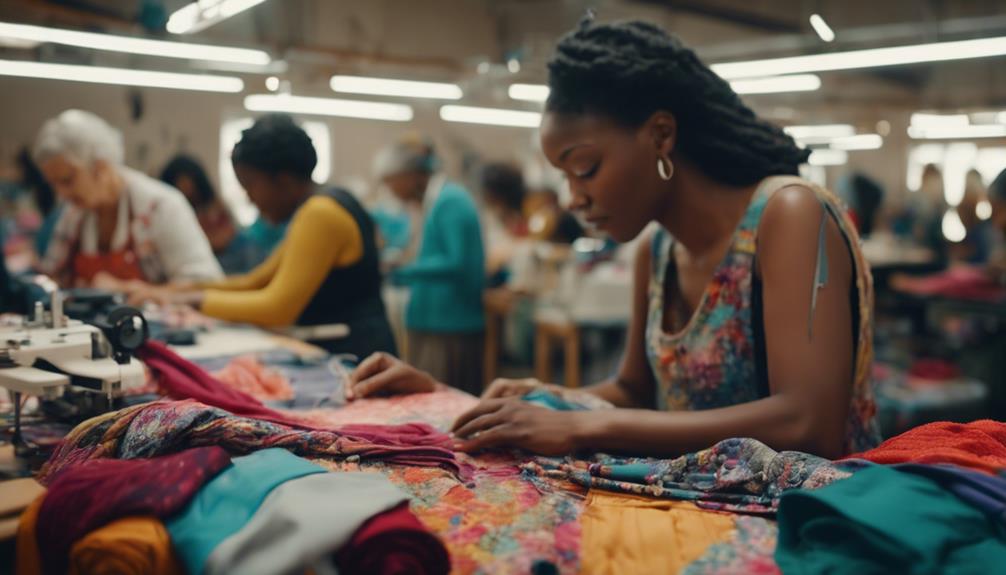
Extending the lifespan of your garments can greatly reduce their environmental impact, making mindful care and maintenance essential for a sustainable wardrobe.
By focusing on how you treat your clothing, you can contribute to responsible consumer behavior and help combat fast fashion.
Here are four powerful ways to extend the lifespan of your garments:
- Proper Washing: Always read care labels and wash in cold water. This not only saves energy but also reduces wear and tear.
- Repair and Upcycle: Don't toss out a torn shirt; fix it! Upcycling allows you to express your style while reducing waste.
- Organized Storage: Store your clothes in a cool, dry place. Folding and hanging items properly prevents damage.
- Mindful Purchasing: Before buying, consider the clothing lifecycle and your actual need for each item. This encourages thoughtful choices.
Educate Yourself on Sustainability
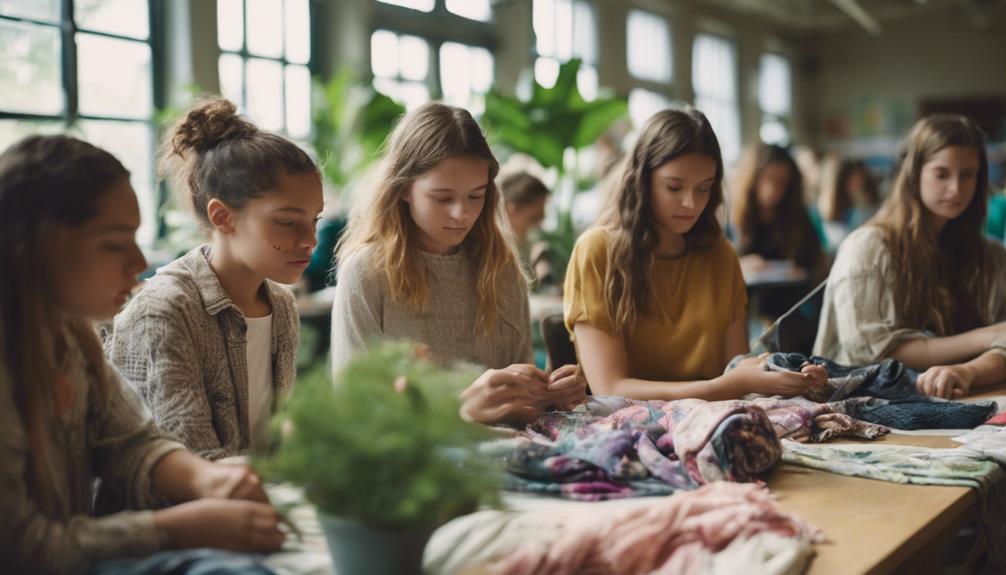
Understanding sustainability in fashion empowers you to make informed choices and reduce your environmental footprint. The fashion industry is a significant contributor to global greenhouse gas emissions, accounting for 10%. This underscores the urgent need for sustainable practices.
By educating yourself about sustainable fashion, you can recognize the importance of responsible consumption and help combat the staggering 92 million tons of textile waste generated each year. Less than 1% of clothing materials are recycled, leading to an annual economic loss of around $100 billion. By learning about recycling initiatives, you can contribute to a circular economy that minimizes waste.
Over 60% of clothing items end up in landfills or incinerators within a year, emphasizing the need to understand garment lifecycles. With 71% of millennials prioritizing sustainability when shopping, it's clear that consumer demand for eco-friendly fashion is rising.
Support Ethical Fashion Brands
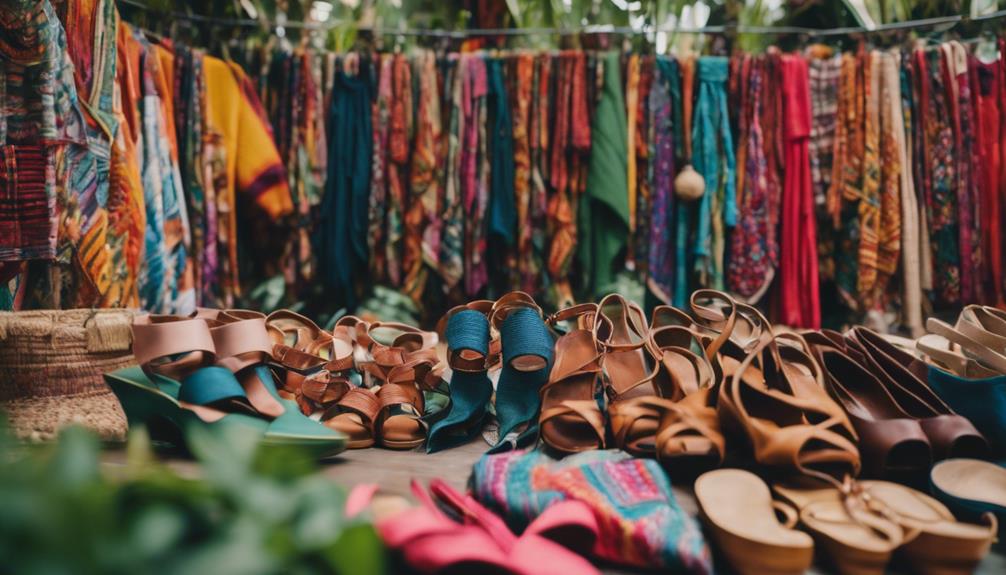
Supporting ethical fashion brands can make a significant impact on the industry's sustainability efforts while aligning your values with your shopping choices. When you choose to support these brands, you're not just making a purchase; you're contributing to a movement. Here's why it matters:
- Better Working Conditions: Ethical brands guarantee fair wages and safe environments for their workers, promoting dignity in labor.
- Sustainable Products: Many of these brands use recycled materials or organic fabrics, reducing your carbon footprint while looking stylish.
- Transparency in Supply Chain: You can trace where your clothes come from, knowing they were made responsibly and ethically.
- Reducing Waste: By supporting ethical brands, you help combat the staggering 92 million tons of textile waste produced yearly.
Frequently Asked Questions
How Can Sustainable Fashion Be Achieved?
To achieve sustainable fashion, you can prioritize innovative materials, support circular business models, educate others on responsible consumption, collaborate with ethical manufacturers, and engage in community initiatives like clothing swaps and repair cafes.
How Can I Enjoy Fashion Sustainably?
You can transform your wardrobe into an eco-friendly wonderland! Embrace minimalism, swap clothes with friends, shop thrift stores, upcycle old pieces, and try rental services. Enjoy fashion while saving the planet—what's not to love?
What Are Some Interesting Facts About Sustainable Fashion?
Sustainable fashion's impact is significant. Did you know 10% of global emissions come from the fashion industry? Plus, extending clothing life by nine months can cut environmental impact by 30%. Mindful choices really matter!
What Does Sustainable Fashion Focus On?
Sustainable fashion's a lifeboat in a sea of waste. It focuses on minimizing environmental impact, promoting ethical practices, and using eco-friendly materials, ensuring the clothing you wear treads lightly on our planet's fragile surface.
Conclusion
Ready to transform your wardrobe and make a real impact?
By diving into sustainable fashion, you're not just changing your style; you're joining a movement that's reshaping the industry.
Imagine walking into a room and confidently sharing your journey of creativity and ethics.
Will you be the one sparking conversations and inspiring others to rethink their choices?
The power's in your hands—are you ready to take the leap and discover what's possible?
The future of fashion awaits!

